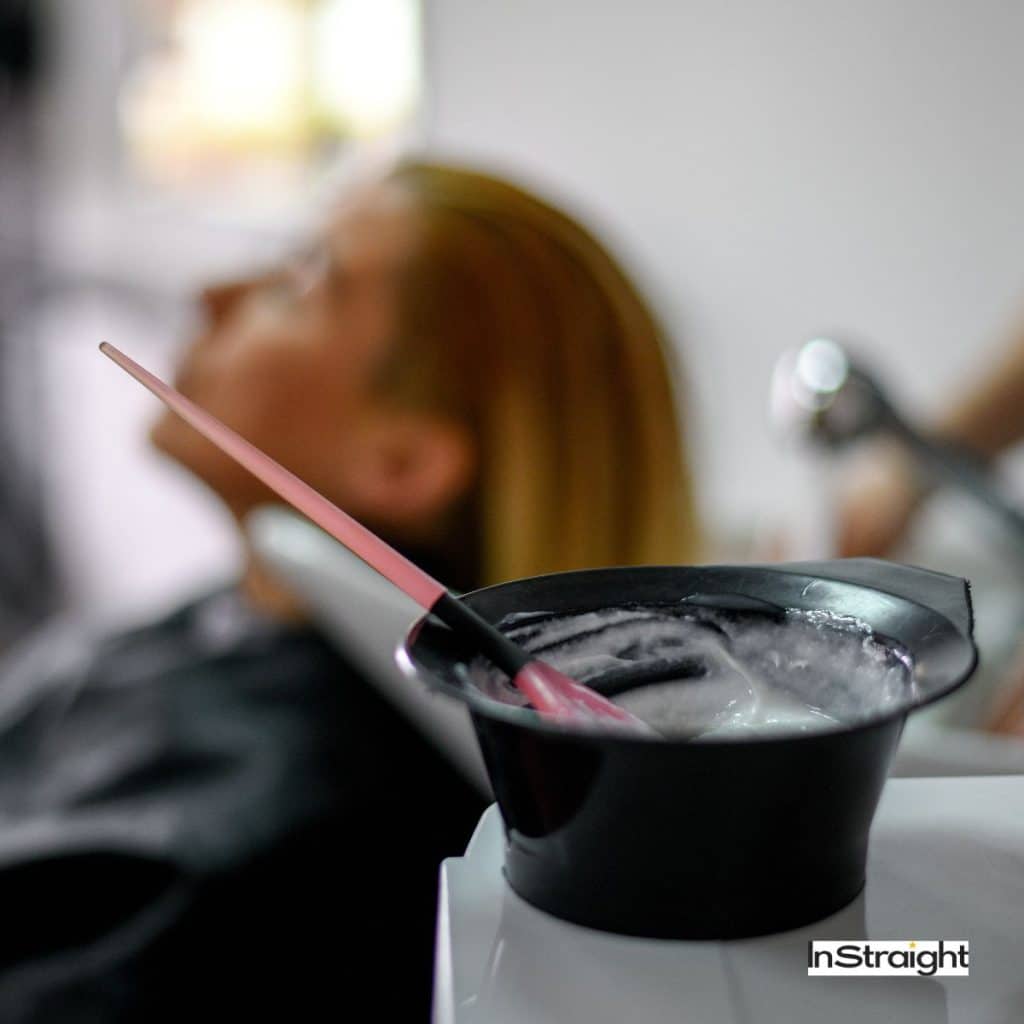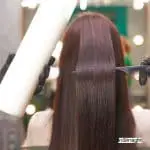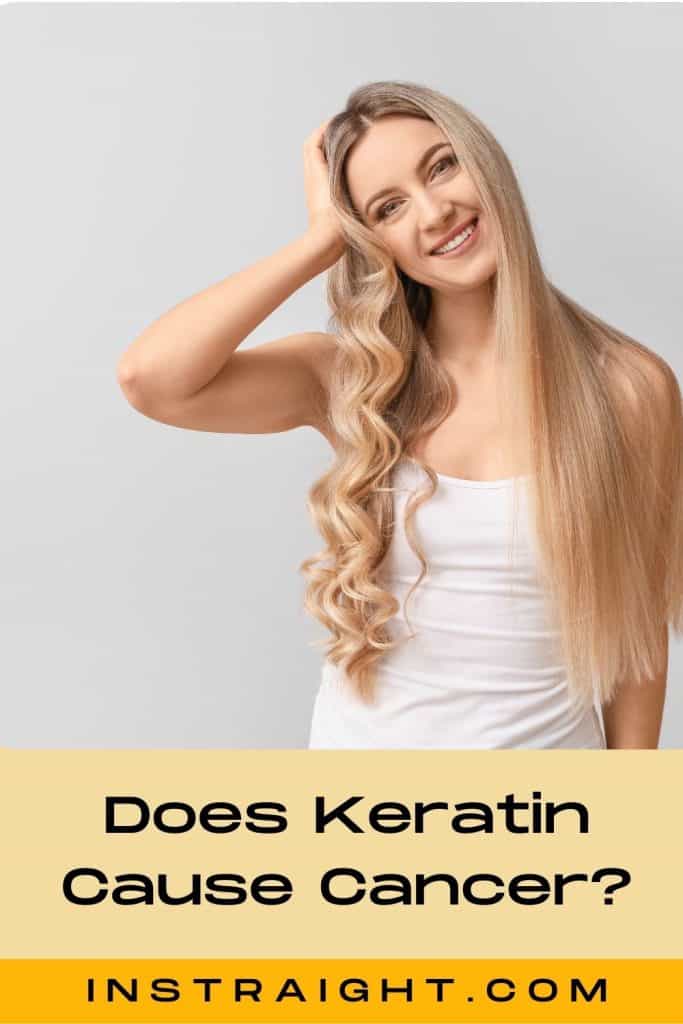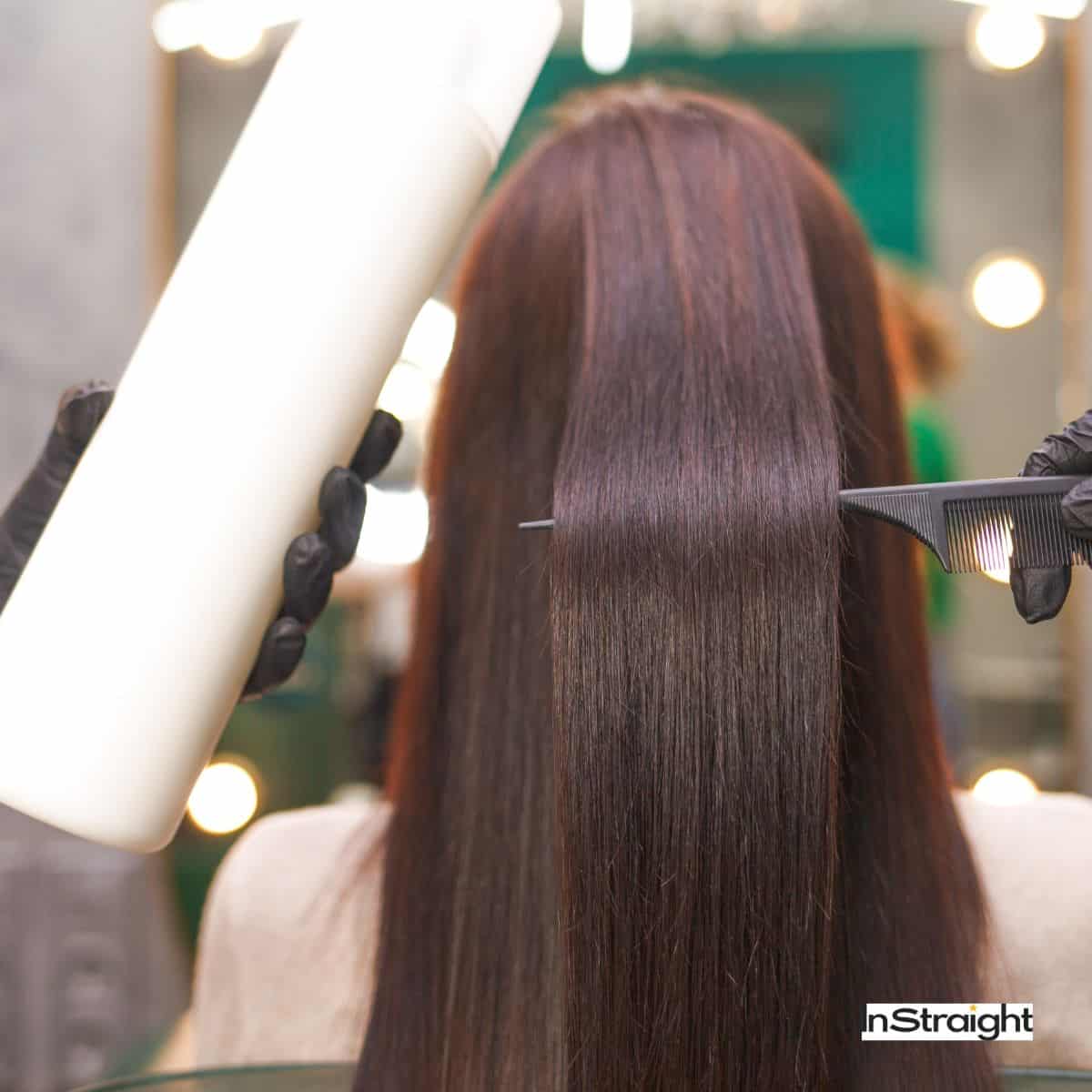Does Keratin cause cancer, and should you be getting a keratin hair treatment?
A Brazilian blowout helps calm your frizzy hair and gives it a smooth look every day. But is it worth it?
Read on as I explain the risk of getting a Keratin smooth treatment on the hair.
Side Effects of Keratin Treatment
Keratin is a natural protein found in the human body which forms the tissues of hair, nails, and skin. (1)
Soon scientists learned of its potential in restoring hair properties. They started experimenting with enhanced keratin binding on damaged and bleached hair and its restoration. (2)
All of that research is what hairstylists use in salons today. But, keratin infused hair straightener has other harmful chemicals such as formaldehyde that can cause cancer.
The National Cancer Institute identifies formaldehyde as a known carcinogen meaning it can cause cancer or facilitate cancer-causing cultured cells.
Check out this detailed video of the side effects of keratin treatments.
@beauty_bee20 #Explore3ingredients #foryou #fypシ #canada_life🇨🇦 #hairloss #hairtok #keratintreatment #panjabi #surrypind #usa_tiktok #panjabitiktok #browntiktok #browngirl #hair #america #panjabisong #haircare ♬ original sound – Knightrider_007🔥
Even products with no formaldehyde in their formulas have exceeded occupational exposure limits. (3)
And that’s not all. While cancer tops the list, there are other side effects of keratin treatment worth mentioning, such as:
- Headaches
- Sore throat
- Eye irritation
- Scalp irritation
- Vomiting
- Coughing
- Dizziness
- Nausea
Will keratin cause hair loss, you ask? Yes. Your wavy hair is exposed to many chemicals and high heat, which could cause hair loss.
Read our complete guide about why does keratin cause hair loss.
Here’s a video on keratin hair straightening and the process involved in smoothing all hair types.
Reasons Why Keratin Treatments Are Linked to Cancer
Every one of us wants smooth and frizz-free hair without running any risk to our own or our hairstylists’ health. But sadly, that doesn’t exist.
Brenda Kamt, a colorist specialist at LA, says: “According to the EPA, formaldehyde is a carcinogen that could cause respiratory problems if exposure is frequent.” (4)
But what even is formaldehyde, and does keratin cause cancer? There have been several studies made on this carcinogen and its allergic reactions. (5)
Formaldehyde is a popular chemical, with over 20 million tons produced yearly. It is a byproduct of cigarette smoke, automotive exhaust, and fires.
In 2004, the National Cancer Institute conducted a study that found a considerable number of cancer patients in 25,000 formaldehyde workers.
The study found that formaldehyde exposures in the funeral industry were associated with a statistically significantly increased risk for mortality from myeloid leukemia. (6)
But what does that have to do with keratin smoothing treatment? Formic aldehyde is used to lock the hair in its new frizz-free and straight position for a couple of months until it is washed away.

The products that don’t use formaldehyde use formalin, ethanediol, methylene glycol, or methanal that release the same carcinogenic gas. Unsurprisingly, several salon technicians refuse to do a keratin treatment altogether.
T.Cooper, an NYC-based hairstylist, says, “Some stylists refuse to do keratin treatments because there is research that shows that continued use of formaldehyde over time can have some serious consequences.” (7)
And, if that weren’t enough, can keratin cause acne too? Absolutely. An excess of keratin can cause a blockage in hair follicles, leading to pimples. Ugghh!
Things You Should Know Before Having a Keratin Treatment
If you are still adamant about getting a keratin treatment, here are some things you should know before hitting the salon.
1. Go to a well-ventilated salon
Make sure you complete the process in a well-ventilated space with open doors, windows, or even outdoors.

2. Don’t overdo it
Brenda Kamt says, “If you’re only getting the treatment done three times per year…the risk is very minimal.”
3. Keratin reorganization changes your hair texture
You may not like the new straightened look, especially if you have beautiful curls.
4. Be prepared for scalp irritation
You will most likely get an eye or scalp irritation during the process. It’s just the way it is.
FAQs
Are keratin treatments safe?

No. Most keratin treatments contain formaldehyde which increases the risk factor of cancer.
Does keratin cause hair loss?
Yes. The process requires high heat on the hair follicle, which can damage the building materials of hair and cause massive hair loss.
What is the safest hair treatment?

Hair botox is the safest treatment that does not contain harmful chemicals and works on frizzy hair just as effectively.
Does all keratin have formaldehyde?
Most Keratin smooth products use formaldehyde except for a few brands that use other chemicals.
Conclusion
Does keratin cause cancer? Yes. If you can do without the treatment, I suggest you do so.
Sure, having a great hair day every single day is a boon but getting a keratin treatment is a slow poison. Why put your health at risk for something that can be achieved with a flat iron and blow dryers?
And if you must have a treatment, opt for a glyoxylic acid treatment instead, which won’t straighten your hair as much but will give you shine and fight frizz.

Resources:
- 1. Bragulla HH, Homberger DG. Structure and functions of keratin proteins in simple, stratified, keratinized and cornified epithelia. Journal of anatomy. 2009;214(4):516-559. doi:10.1111/j.1469-7580.2009.01066.x
- 2. Baus RA, Leichner C, Steinbring C, Bernkop-Schnürch A. Strategies for improved hair binding: Keratin fractions and the impact of cationic substructures. International Journal of Biological Macromolecules. 2020;160:201-211. doi:10.1016/j.ijbiomac.2020.05.131
- 3. Pierce JS. Characterization of Formaldehyde Exposure Resulting from the Use of Four Professional Hair Straightening Products. Published November 2011. https://www.researchgate.net/publication/51754792_Characterization_of_Formaldehyde_Exposure_Resulting_from_the_Use_of_Four_Professional_Hair_Straightening_Products
- 4. Metzger C. Should You Get a Keratin Treatment? A Definitive Answer. Marie Claire. Published September 2017. https://www.marieclaire.com/beauty/hair/news/a29189/keratin-treatment/
- 5. Swenberg JA, Moeller BC, Lu K, Rager JE, Fry R, Starr TB. Formaldehyde Carcinogenicity Research: 30 Years and Counting for Mode of Action, Epidemiology, and Cancer Risk Assessment. Toxicologic pathology. 2013;41(2):181-189. doi:10.1177/0192623312466459
- 6. Hauptmann M, Stewart PA, Lubin JH, et al. Mortality From Lymphohematopoietic Malignancies and Brain Cancer Among Embalmers Exposed to Formaldehyde. JNCI Journal of the National Cancer Institute. 2009;101(24):1696-1708. doi:10.1093/jnci/djp416
- 7. Everything You Need To Know About Keratin Hair Treatments. Harper’s BAZAAR. Published August 9, 2022. Accessed September 5, 2022. https://www.harpersbazaar.com/beauty/hair/a1266/how-keratin-damages-hair/
- About the Author
- Latest Posts
Olaf Bieschke is a senior year medical student from Charité University of Berlin in Germany. He has gained professional experience in various hospitals and offices in Germany, Belgium, France, Poland, Brazil and Spain. Currently working on a dr. med. title thesis in neurosurgery. You can find more about him HERE. Follow him on LINKEDIN AND FACEBOOK

